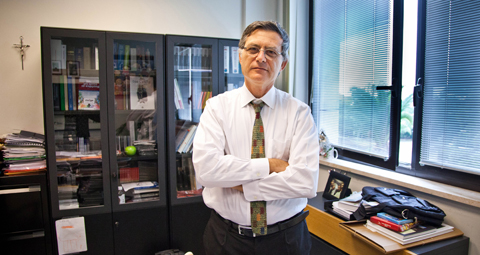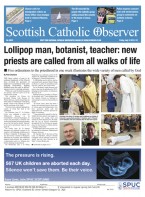July 5 | ![]() 0 COMMENTS
0 COMMENTS ![]() print
print

Vatican’s top communications man on conveying the Church’s message
Peter Kearney meets the award-winning lay journalist running the Vatican media machine
It is four years since Pope Francis instigated a comprehensive revamp of the communications structures of the Holy See.
Several previously autonomous departments, including the Vatican Press Office, Vatican TV and Radio, the L’Osservatore Romano newspaper and the Pontifical Council for Social Communications, were consolidated into a single department, the Secretariat for Communications, in June 2015.
Mgr Dario Vigano, former director of the Vatican Television Center, was appointed as its first prefect and served for three years, during which time he attended the European Conference for communications officers held in Glasgow in 2017, where he heard first-hand about the work of the Church in Scotland.
Laity led
In June 2018, the Secretariat was renamed Dicastery for Communications, at which time Pope Francis appointed award-winning lay journalist Paolo Ruffini as prefect, in the process making him the first layman ever to head a Vatican dicastery.
Two weeks ago, I travelled to Rome to meet him and to update him on the communications work which the Church undertakes in this country while hearing directly about his vision for communications in the universal Church.
Although the restructuring has seen a significant drop in the number of staff employed in the communications field, the dicastery still has an enormous remit.
Worldwide
There are 35 languages used in the department and content is produced in all of them on a daily basis.
When I asked Dr Ruffini how important English language output is, he conceded that English is ‘a very important language’ and admitted that he ‘would like to do more to make more use of English in our output.’
Dr Ruffini is charming and welcoming when I join him in his office on the Via della Conciliazione, just outside St Peter’s Square.
Like so many Italians, he is fond of Scotland and recalled a recent holiday here with his wife, which included visits to Edinburgh and Skye.
Convergence
He explained that the restructuring was to make all the departments of communications convergent and better connected but pointed out that there was also an economic imperative, as the various Vatican communications departments had grown to the point where they employed over 600 people.
As an award-winning journalist, he understands the importance of media engagement for the Church and its mission.
Taking a balanced view of the various tools at the disposal of today’s media officers and refusing to put all his resources into the seemingly miraculous world of social communications, he advocates a multi-disciplinary approach.
“There is not just one form of communication,” he said. “Radio is important and the press still has its role.
“The Catholic press is important and can be even more meaningful if it doesn’t just think of itself offering a perspective to Catholics but offering it to wider society.”
evangelisation
On social media and its use as a tool of evangelisation, I ask Ruffini about his recent observation that ‘the risk that comes with the times is building tribes rather than communities.’
While the Church still has to ‘deal with the dangers of the echo chamber,’ he said we ‘have to break this idea that interacting with the wider social media networks (beyond church networks) means Catholics lose their identity.’
In fact, he said, the opposite is true and we will lose our identity if we don’t engage with the wider social media.
As Ruffini pointed out, social media didn’t really exist 10 years ago, and he predicted that it will keep changing as new technologies develop.
Digital revolution
Before long, he said, there will be a second revolution in the digital world, with developments we can’t yet guess.
Regardless of where technology takes us, he echoed the words of Pope Francis when he said ‘one-to-one contact is still fundamental to communications and evangelisation.
Various media bring us a step closer and allow us to communicate, but the personal will always be very important.’
Leaving his office and making my way back out into the Rome sunshine, I felt reassured that the vital mission of Church communications is safe in the hands of Dr Paolo Ruffini.










